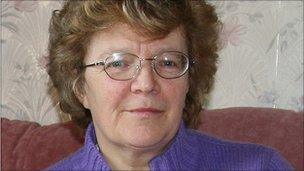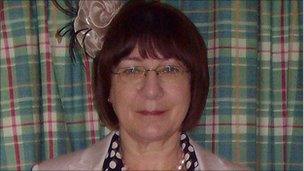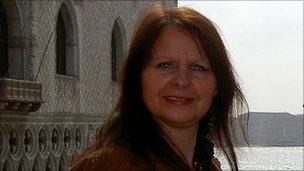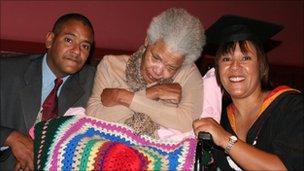Alzheimer's disease: Your experiences
- Published
A new method using brain scans to spot the early signs of Alzheimer's disease is being tested in NHS memory clinics.
It is hoped that the new system will enable patients to be identified and treated sooner, increasing the chance of slowing the progress of the condition. At the moment diagnosing Alzheimer's in the early stages is extremely difficult.
BBC News website readers have been sending in their experiences of Alzheimer's disease, and reacting to the new diagnostic method.
Rosalind Mercer, Bedford
It's good to have an early warning of this disease - it's a time-bomb ticking away in Britain.

Rosalind wants greater awareness about dementia
We have an ageing population and more and more people are going to be diagnosed with dementia. We need to raise awareness of the problem now.
My husband, who is 63, has early onset Alzheimer's Disease. It was diagnosed two years ago, but he had symptoms for at least three years prior to that.
He is now terribly ill and it appears that he has mixed dementias - frontal lobe as well as Alzheimer's.
It was I who had to push for him to have the Addenbrookes test that usually pinpoints Alzheimer's. Originally he was diagnosed with Minor Cognitive Impairment (MCI). Fifteen per cent of MCI cases end up as Alzheimer's and my poor husband was one of them.
His deterioration has been rapid. This time last year we were on a walking holiday and I was able to care for him.
By August 2010 he was admitted to hospital confused, hallucinating and violent. He was prescribed anti-psychotics. When he was released he was put in an NHS home, where he just walks and walks all day, refusing to sit down and is even fed as he walks around. He is incontinent, does not know me at all and is getting thinner and thinner.
Most people think that Alzheimer's is a disease that affects elderly people - but actually many sufferers are quite young, they can have children, and their partners often struggle financially. My own husband is still not old enough to draw his pension, but he is totally unable to work.
The other distressing element to the condition is that it can change the patient's personality. My husband used to be a mild-mannered person - but not any more. It's like an alien has taken over his body.
I have lost my friend, my partner and my companion and with it any faith that I might have had.
Sarah Raines, Sussex
Anything that helps to identify Alzheimer's disease in the early stages will allow drugs to be given to prevent the illness from taking its devastating toll for just a little bit longer.

Sarah believes her husband benefited from drugs which slow the progress of Alzheimer's
My husband was given Aricept, and I believe that this gave him two to three years with a better quality of life than would otherwise have been the case. He has now been in a care home for just over a year, and although the care home is excellent, his condition is now so bad, the man I married in Barbados in 2000 is now just a distant memory.
I visit him every week, and every time I feel so sad for the lost future that he thought he had. He will be collecting his pension at the end of April, on the day of the Royal Wedding to be precise. He used to long for the day he could retire, but that day will now never come.
He lives in a little world of his own, and his carers are the best, but he should be here with the brain function he once had, enjoying life. Being proud to see his son get married later this year, being excited to see Crawley play Manchester United in the FA Cup, knowing that this year his birthday is also a bank holiday and enjoying doing the garden.
He has lost his soul and this is the real tragedy of Alzheimer's.
John, London
I am pleased to hear about this new development.
My mother died of Alzheimer's and I am beginning to worry about lapses in my memory. I would like to undergo these tests to see if I am showing early signs of the condition.
My mother was being cared for in a home but used to come to our house for lunch every Sunday. One afternoon when I was briefly out of the room, she began choking on her food, because she kept putting more in her mouth, but forgot to eat it.
I called an ambulance and they managed to revive her, but she remained in a coma for four and a half years. Finally she was unable to clear her lungs of fluid, and she passed away.
This is something which I would like to highlight about Alzheimer's - it can have unexpected consequences.
In a sense, my mother died from the condition, although it was not the direct cause of her death.
Karen Thirlby, Worcester

Karen is worried about her parents
This new system sounds marvellous and I wish my mother could be tested.
As my father already has Alzheimer's, it will be a big blow if my mother has the condition too. At the moment it feels as if the tests aren't quick or conclusive, and if you are told your relative has this condition, you want the diagnosis to be certain.
My father was diagnosed with Alzheimer's about eight years ago. He takes a tablet every day and he is quite stable at the moment, but does get very confused.
He has always relied on my mother, who cooks and cleans for him. His condition is manageable at the moment.
However for the past two years my mother has shown signs of being confused.
She is forgetting things and not cooking meals - which has an impact on my father. Now social services have provided them with a carer at lunch times three times a week.
My mother was sent for a brain scan and questioned at a memory clinic and they said it was just memory loss.
However we are taking her back to the clinic because she is worse. The system seems to take for ever and I am very worried about their safety and decision making.
Anne-Marie Mitchell, Stoke-on-Trent
I am really pleased by this scientific advance.

Anne-Marie and her brother Andrew hope other families will be helped by early diagnosis
Getting a diagnosis quickly rules out other possibilities and allows loved ones to concentrate on caring for their relatives, instead of worrying because they don't know what's wrong with them. Once a diagnosis is made everyone concerned can prepare for the future and what it will bring.
I lost my mother two years ago, aged 69, after she had Alzheimer's for ten years. She didn't get an early diagnosis - we had to wait for twelve months for it. After that she was put on medication. She began to suffer from hallucinations, and we weren't sure whether they were due to the drugs or her condition.
At the same time as she was diagnosed, we found out my brother Andrew had a brain tumour, which needed surgery. He was my mother's primary carer, and after his operation he continued to look after her.
Eventually I felt that he was putting his own life on hold to care for my mother, and it was affecting his own recovery. I moved my mother into a care home, closer to where I live. It was a difficult decision to take, but I felt that home care wouldn't provide her with enough support.
I fear for myself and often wonder what I am going to do if I develop Alzheimer's, especially as I have a son and a loving partner. I wouldn't want anyone to go through what my brother and I experienced whilst my mother was ill.
- Published7 March 2011
- Published2 September 2010
- Published22 December 2010